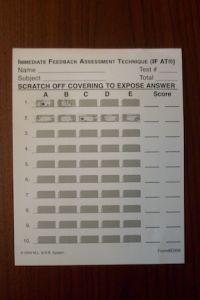For the first fifteen minutes the class was quiet, heads studiously bent over their papers as individual quizzes were taken. The only sound in the room, our footsteps as we moved about placing one card in front of each group of 4 students. When Professor Kelly Grindrod announced “Okay, 15 more minutes to do the cards in your groups”, the class erupted into: noisy chatter; intense discussion; whoops of joy and high fives; an occasional groan of dismay. Moving about the classroom this time it was invigorating listening to the students discuss their chosen answers, argue their opinions, and reasoning together as they worked to reach consensus on which answer was correct and thus which box to scratch. The energy was palpable.
So what were they doing? What caused this classroom transformation? The students were completing the same quiz that they had just done individually but this time as a group, checking their answers by scratching boxes on cards called IF-AT. The IF-AT (Immediate Feedback Assessment Technique) produced by Epstein Educational Enterprises is a multiple-choice assessment and learning tool in which students scratch the box corresponding to their chosen answer and know immediately if that answer was correct.  At first glance it looks a little bit like a scratch-and-win lottery ticket admittedly; if used thoughtfully by students – not at all. If an incorrect choice is made immediate feedback (no star in the box) is received. The students then have the opportunity to re-think, and in the case of Kelly’s class re-discuss, re-convince, re-argue, and then attempt again. Full marks are achieved for the first correct answer and progressively lower partial marks for subsequent attempts. In the class that I observed students actively and interactively worked to discuss and understand the question principle before attempting again.
At first glance it looks a little bit like a scratch-and-win lottery ticket admittedly; if used thoughtfully by students – not at all. If an incorrect choice is made immediate feedback (no star in the box) is received. The students then have the opportunity to re-think, and in the case of Kelly’s class re-discuss, re-convince, re-argue, and then attempt again. Full marks are achieved for the first correct answer and progressively lower partial marks for subsequent attempts. In the class that I observed students actively and interactively worked to discuss and understand the question principle before attempting again.
While collecting the individual quizzes and IF-AT cards at the end of the second 15 minutes I had a chance to chat with a number of the students. Some found it stressful, others found it less so than a “regular” quiz, but all agreed that the IF-AT format of quizzing was a great deal of fun (it was a low stakes 2.5% quiz). Being from a Teaching Centre, I just had to ask how they felt these quizzes affected their learning. Every student I spoke to said that, yes, they thought it helped them learn; noting the discussion, taking the time to really think about the problems and the immediate feedback. Incidentally, that is exactly what Dr. David DiBattista (the multiple choice exam guru from Brock U) and colleagues have reported in their studies.
What most struck me though was that these students were having fun! Fun, engaged, learning – seems good to me!
DiBattista, D. (2005). The Immediate Feedback Assessment Technique: A learner-centered multiple-choice response form. Canadian Journal of Higher Education, 35, 111-131.
